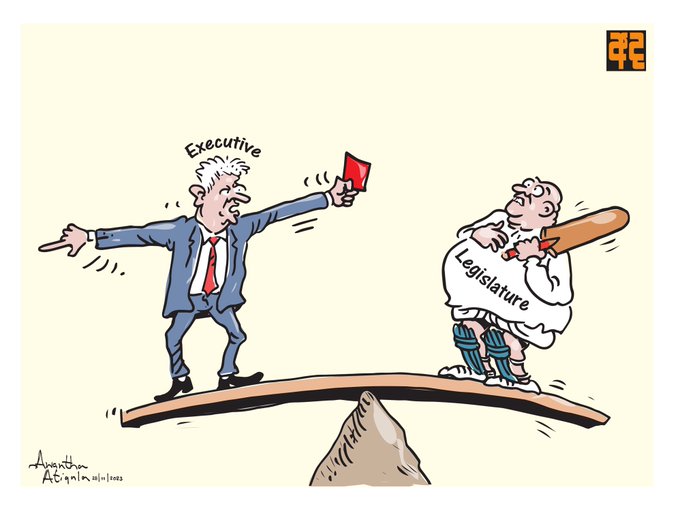Ada newspaper cartoon by @awanthaartigala /
No country could be described as democratic if there is no separation of powers that ensures one branch of government does not exceed its powers, former head of the Human Rights Commission of Sri Lanka (HRCSL) Prof. Deepika Udagama said in a televised interview on Tuesday (28.)
“The three branches of government, i.e., the executive, the legislature, and the judiciary, must keep an eye on each other so that there is a balance. The 1978 Constitution centered power on the executive president. The question ever since has been how to put limits on the power of the executive president and to achieve balance between the three branches of government,” she said.
The establishment of the constitutional council in 2001 was an attempt to limit the power of the president, Prof. Udagama said. The Council is to ensure that the president does not make appointments to key positions on his own.
“The idea is that these key positions must be appointed through consensus,” she said.
President Ranil Wickremesinghe recently told parliament that the Council failed to approve his nominee to the Supreme Court and his continuing requests to reappoint the current IGP long after his age of retirement.
The president added that the lack of approval has resulted in the police not functioning and the courts coming to a standstill.
The President also announced his decision to appoint a Parliamentary Select Committee to probe delays by the Council.
“The 20th Amendment made the executive president extremely powerful. 21st was brought to amend this, and President Ranil Wickremesinghe played a role in passing the amendment. Almost everyone who becomes president, depending on his or her view of the executive president, brings an amendment to the constitution. They make the constitution in their image using the two-thirds majority,” she said.
The Constitutional Council was established first under the 17th Amendment under specific political circumstances, Prof. Udagama said. The executive presidency was held by Chandrika Bandaranaike Kumaratunga, who represented the Sri Lanka Freedom Party, while the parliamentary majority was held by the United National Party. Most parties agreed that the powers of the executive needed to be limited. The Mahinda Rajapaksa administration that followed undermined the 17th Amendment and, in 2010, abolished the 17th Amendment by passing the 18th Amendment.
“The 18th Amendment established the parliamentary council, which had no power. The Constitutional Council was brought back under the 19th Amendment during the yahapalana government. President Gotabaya Rajapaksa abolished it again with the 20th Amendment to the Constitution. The 21st Amendment was an acknowledgement that the president must not be given such unlimited powers,” she said.
The Constitution is the supreme law of the land, but successive presidents have remade the Constitution the way they want, she said. This is against the idea of democracy and what a constitution is, Prof. Udagama said.
“Maybe the next president will bring in the 22nd Amendment. This is not good. This is making light of the Constitution,” she said.
(RK)
Courtesy of The Island
